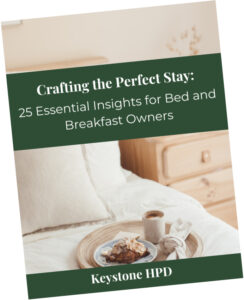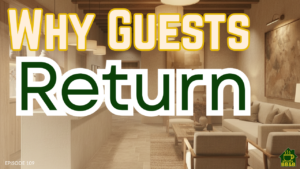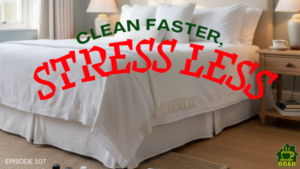Table of Contents
- 1
- 2 Protecting your property from risks is key to long-term success—here’s a breakdown of the most important types of B&B insurance.
- 3 ⇒ TO READ OR LISTEN TO THIS EPISODE ON KEYSTONE HOSPITALITY PROPERTY DEVELOPMENT
- 4 How to Describe Your Bed and Breakfast In One Sentence (Without Cringe)-109
- 5 How Can B&B Confirmation Emails Reduce Guest Confusion?-108
- 6 How Do B&B Owners Clean Faster Without Cutting Corners?-107
Protecting your property from risks is key to long-term success—here’s a breakdown of the most important types of B&B insurance.
Opening a Bed & Breakfast is exciting, but with that excitement comes the responsibility of protecting your investment. That’s where insurance and tax planning come in. As a B&B owner, you’re not just running a small business; you’re managing a property where people stay overnight, which adds another layer of risk and complexity. Having the right insurance coverage and understanding your tax obligations is critical to ensuring your B&B’s long-term success.
.
In this episode, I’ll look into the types of insurance you need and the key tax implications to keep in mind as a B&B owner.
.
.
Why Insurance is Essential for Your B&B
Running a B&B means you’re not only responsible for your property but also for the safety and well-being of your guests. Accidents happen, and without proper insurance, you could face significant financial and legal consequences. Let’s look at the most important types of insurance for B&B owners.
.
.
Types of Insurance for B&B Owners
Property Insurance
First things first: you’ll need property insurance to protect your building, whether it’s your home or a separate property. Property insurance covers damage to your building and its contents due to incidents like fire, theft, and certain natural disasters. Given that your B&B is both a home and a business, you’ll need specialised coverage. Regular homeowner’s insurance won’t be enough since you’re operating a business out of the property.
.
Liability Insurance
This is arguably the most important type of insurance for B&B owners. Liability insurance protects you if a guest is injured on your property. For example, if a guest slips on an icy step or suffers a fall in your home, liability insurance helps cover medical costs and potential legal fees. Without it, you could be held personally liable.
.
Business Interruption Insurance
What happens if you’re forced to close your B&B for repairs after a fire or flood? Business interruption insurance helps cover your lost income during that downtime. This type of coverage can be a lifesaver when unexpected events stop you from generating revenue.
.
Employer’s Liability Insurance
If you have employees, even part-time cleaners or cooks, you may be required to have employer’s liability insurance. This covers costs if an employee gets injured or sick while working at your B&B.
.
Example: I once worked with a B&B owner who faced a guest’s lawsuit after a simple accident—a rug slip led to a broken ankle. The liability insurance covered legal costs and compensation, saving the business from potential bankruptcy.
.
.
Tax Considerations for B&B Owners
Running a B&B means keeping track of more than just the guest bookings and breakfast orders—you’ll need to stay on top of your tax obligations too. Taxes for B&B owners can be tricky, especially when your home is also your place of business. Let’s break down some of the key tax considerations.
.
.
Income Tax: How Much Do You Owe?
Like any business, your B&B income will be subject to tax. But unlike other small businesses, you may also live in the property, which can make things a little complicated. You’ll need to report your earnings from guests and deduct any expenses related to running your B&B.
.
These expenses can include everything from cleaning supplies to repairs and marketing costs. The more accurately you track your business-related expenses, the lower your taxable income will be. Make sure you keep detailed records of all receipts and payments.

Tax Deductions for B&B Owners
One of the perks of running a B&B from your home is that many of your expenses are tax-deductible. But which ones?
- Property Expenses: A portion of your mortgage interest, property taxes, and utilities may be deductible, based on the percentage of your home used for the business.
.
- Maintenance and Repairs: If you’ve made improvements to your property to accommodate guests—like upgrading bathrooms or installing fire safety equipment—these costs may be deductible.
.
- Food and Hospitality: The cost of providing meals to your guests can also be deducted. This includes groceries, cooking supplies, and any kitchen upgrades made to accommodate guest services.
.
It’s worth noting that not all improvements are immediately deductible—some may need to be depreciated over time. Consult a tax professional to maximise your deductions.
.
Just think of all those lovely meals you’ll be preparing for guests—at least you can deduct that giant pancake griddle you splurged on!
.
.
VAT & Other Taxes
Depending on your location and income, you may be required to register for VAT (Value Added Tax). This generally applies if your B&B reaches a certain income threshold, so it’s something to keep an eye on as your business grows. VAT can be complicated, so consult with an accountant to make sure you’re complying with local regulations.
.
Some regions also impose specific taxes on guest accommodations, like tourism or bed taxes. These taxes are typically passed on to guests, but must be collected and remitted to the local government. Make sure you’re familiar with the requirements in your area.
.
.
Keeping Accurate Records
It’s important to keep detailed records of both your income and expenses. Many B&B owners find that setting up a separate business bank account makes this much easier. Use accounting software to track your earnings, expenses, and tax payments throughout the year, so you’re not scrambling when tax season arrives.
.
Example: A friend of mine who runs a B&B didn’t keep proper records during her first year of business. She ended up missing out on several deductions and owed more tax than necessary. Lesson learned—keep those receipts organised!
 Tired of the dizzying array of analytics and planning required to enhance your bed and breakfast? We’re here to help! Our ‘Crafting the Perfect Stay – 25 Essential Insights for Bed and Breakfast Owners’ is your free ticket to simplicity and success. It’s as invigorating as your morning smoothie, loaded with the knowledge you need. Download it now and start creating unforgettable experiences at your B&B!
Tired of the dizzying array of analytics and planning required to enhance your bed and breakfast? We’re here to help! Our ‘Crafting the Perfect Stay – 25 Essential Insights for Bed and Breakfast Owners’ is your free ticket to simplicity and success. It’s as invigorating as your morning smoothie, loaded with the knowledge you need. Download it now and start creating unforgettable experiences at your B&B!
What’s your biggest concern when it comes to B&B insurance or taxes?
Share your thoughts in the comments.
In conclusion
Insurance and taxes might not be the most exciting part of running a B&B, but they’re crucial to protecting your business and your peace of mind. From liability insurance to tax deductions, making sure you’re covered financially will help your B&B run smoothly for years to come.
⇒ TO READ OR LISTEN TO THIS EPISODE ON KEYSTONE HOSPITALITY PROPERTY DEVELOPMENT
Serious about taking your business to the next level? Sign up for the “Inn-side Track: Mastering Your B&B Business” course
https://courses.keystonehospitalitydevelopment.com/course/inn-side-track-mastering-your-bb-business/
.
Grab your copy of the “Crafting the Perfect Stay: 25 Essential Insights for Bed and Breakfast Owners” PDF
https://bedsbreakfastsbusiness.com/crafting-the-perfect-stay-25-essential-insights-for-bed-and-breakfast-owners-download
.
Join our groups
.
Listen to The Hospitality Property School PODCAST here
Beds, Breakfast & Business Podcast
.Gerry MacPherson
Say hi on social …
.
A Division of Keystone Hospitality Property Development




